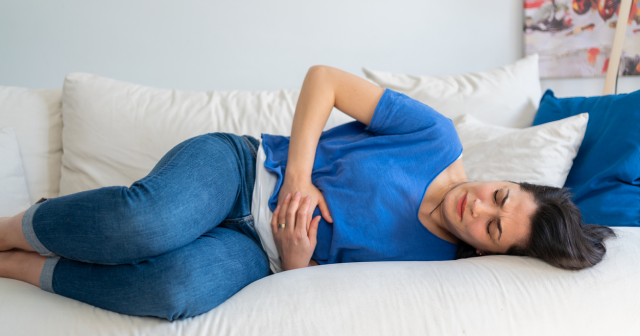What is menopause?
Menopause is a normal part of getting older, which usually happens between the ages of 45 and 55. It’s when your ovaries stop releasing eggs (ovulating), your periods come to an end and you can no longer get pregnant.
Menopause doesn’t usually happen suddenly – you may have several years of changes to your periods, along with other menopausal symptoms, before your periods stop completely. This stage leading up to your final period is known as perimenopause.
Once you’ve gone 1 year without having a period, you’re usually considered to have reached menopause. But if you're under 50, there’s still a small possibility of getting pregnant for up to 2 years after your last period.
Menopause affects people in different ways. The common symptoms of menopause, such as hot flushes, night sweats and vaginal dryness, are caused by falling levels of hormones in your body, which happens as your ovaries stop working.
Your body will also start to use energy differently and your fat cells will change. You may find your body shape changes and you put on weight more easily. Your bone and heart health can also be affected.
The menopause is a natural process and doesn’t always need to be treated. But if symptoms are affecting your daily life, there are treatments and lifestyle changes that can help.
Read on to learn more about menopause symptoms, causes and treatment.
Menopause symptoms
Most people who go through the menopause will get some symptoms, although how long these last and how severe they are varies from person to person. You may have few or no signs of menopause, or the symptoms may have a serious impact on your life.
It’s also common to get symptoms for a few months or years before your periods stop, during the perimenopause. And after your final period (postmenopause), you’re likely to have menopause symptoms for a few years or more.
If you reach menopause suddenly rather than gradually – for example, because you’ve had a hysterectomy with your ovaries removed – your symptoms may be worse.
How your menstrual cycle changes during perimenopause
A change in your periods is often the first noticeable symptom of perimenopause. As your ovaries stop working, your levels of the hormone oestrogen fall, which may cause the following symptoms:
- having periods more or less often than you used to
- skipping 1 or more periods – you may not have a period for several months
- periods that are shorter, longer, lighter or heavier than they used to be
Common symptoms of menopause and perimenopause
As well as changes in your menstrual cycle, you may get the following symptoms of menopause:
- hot flushes – the most commonly reported menopausal symptom. Hot flushes cause a sudden feeling of heat in your face, neck and chest, which spreads all over your body and may last a few minutes. You may also sweat, get heart palpitations or feel anxious, and feel chilly afterwards. They can happen once or twice a day, or as much as once an hour
- night sweats – hot flushes that happen while you’re asleep. They may make you sweat through your clothes and bedding, and can wake you up when you get hot or cold. Lack of sleep can then lead to other problems, such as being really tired and lacking in energy during the day (fatigue) and mood swings
- sleep problems, including insomnia – even if you don’t have night sweats, you may have trouble falling asleep or staying asleep
- vaginal dryness – the tissues inside your vagina and the tube that carries your pee (urethra) can get thinner and dry out as your oestrogen falls. Vaginal dryness can cause itching, discomfort and pain during sex
- sore breasts (breast tenderness)
- low sex drive (libido) – lower levels of oestrogen and testosterone can lead to a loss of sexual desire. Vaginal dryness can also impact your libido, as can things such as low mood and negative feelings about ageing
- hormonal headaches
- joint pain
- urinary tract infections (UTIs) that keep coming back (recurrent UTIs)
- brain fog – problems with concentrating and memory
- mood swings, anxiety or depression
- hair loss
- loss of muscle mass
Read about unusual menopause symptoms to look out for and whether menopause can cause itchy skin, dizziness or nausea.
Symptoms after the menopause (postmenopause)
You may find that many of the symptoms you have during perimenopause ease off or go away after the menopause.
However, your risk of certain health conditions can also increase. It isn't always clear whether this is due to the menopause itself, or ageing in general. But after the menopause, you may have a higher risk of:
- weaker bones, osteoporosis and fractures
- heart (cardiovascular) disease
- stroke
When to see a doctor about the menopause
See a doctor as soon as possible if:
- you’re having periods more often than every 3 weeks, very heavy periods, bleeding after sex or bleeding after the menopause (even if it’s just a spot of blood)
- you feel pain deep inside when you have sex
- you have unusual discharge from your vagina
- you have symptoms of a UTI that aren’t getting better after 2 days
- you have blood in your urine and pain on one side of your back
- you feel low, depressed or anxious and the feelings aren’t going away, even after self-care measures
- you have joint pain with swelling or redness
- you have night sweats with weight loss or swollen glands
- you’re losing weight without meaning to
- you’re worried about side effects from menopause medication you’re taking, such as HRT
It’s also a good idea to see your doctor if:
- you have menopausal symptoms that are worrying you
- your symptoms aren’t getting better with self-care, or they keep coming back
- you’re getting symptoms of the menopause and you’re under 45
What causes the menopause?
You’re born with a certain number of eggs in your ovaries, and every time you release one (ovulate) during your monthly menstrual cycle, you have one less. The menopause is when you run out of eggs. This usually happens between the ages of 45 and 55.
In perimenopause, your ovaries stop producing as much of the sex (reproductive) hormones oestrogen and progesterone and don’t release an egg every month. Then eventually you stop ovulating and having periods altogether.
It’s also possible to have an early menopause. Menopause is considered to be early if it happens between the ages of 40 and 45 and there’s no other reason for your periods stopping. If your ovaries stop working before you’re 40, this is known as premature ovarian insufficiency (POI) or premature ovarian failure.
Early menopause can happen naturally and there’s not always an obvious cause, but it can also happen due to:
- medical conditions, including type 1 diabetes, Addison’s disease and Down’s syndrome
- medical treatment, such as surgery to remove your ovaries (oophorectomy)
- cancer treatment, such as chemotherapy and radiotherapy
Early menopause caused by medical issues is sometimes known as medical menopause or surgical menopause.
How is the menopause diagnosed?
A doctor can usually confirm if you’re perimenopausal or menopausal by talking to you about your symptoms.
Tests aren’t often needed. But you may have blood tests to measure your hormone levels if you’re under 45, or you have symptoms that suggest there may be another condition affecting your periods.
If a doctor thinks something else might be causing your symptoms, they may do a physical examination or suggest other tests.
They will also ask about your medical and family history, to work out if you’re more at risk of certain conditions after menopause.
If you’re at high risk of osteoporosis, your bone density may be measured with a kind of X-ray called a bone density scan. This may be done if you take steroids regularly, have certain medical conditions, or smoke or drink a lot of alcohol.
You may be referred to a specialist if lifestyle changes and medical treatments aren’t helping with your symptoms, you have a condition that may affect what treatment you can have, or another medical issue could be causing your symptoms.
How are the symptoms of menopause treated?
Not everyone needs medical treatment for menopause symptoms. If your symptoms are mild, these simple self-care measures can often be helpful.
For hot flushes and night sweats:
- dress in layers, so you can remove clothes if you overheat and add them if you get cold
- wear clothing that’s breathable, such as cotton underwear, or absorbs moisture
- turn down the central heating
- use a fan
- avoid possible triggers such as hot drinks, caffeine, spicy foods and alcohol
- put a cool, damp cloth on your chest, neck and head when you get hot, or have a cool shower
- stop smoking if you smoke (smoking makes hot flushes worse)
- exercise regularly and lose weight if you need to
- sleep in a cooler room
- reduce your stress levels
Read more about how to stop hot flushes without HRT.
For vaginal dryness:
- use a vaginal moisturiser
- use a lubricant for sex
For sleep problems:
- go to bed and get up at the same time every day, even if you don’t sleep well. Read more about the best bedtime routine for a good night’s sleep
- don’t take naps, as they can make sleep problems worse
- avoid caffeine in the afternoon and don't drink too much alcohol
Read more about how to get better sleep.
For mood changes:
- exercise regularly – exercise can help with low mood, depression and anxiety. Read more about self-care for depression
- talk to others who are going through the menopause, or to a doctor, so you can get the social support you need
- try relaxation techniques such as mindfulness meditation, breathing exercises or yoga
For preventing weak bones and osteoporosis:
- eat a healthy, balanced diet – this includes fruit, vegetables and sources of calcium to build your bones, such as low-fat milk and yogurt
- exercise regularly – including weight-bearing and resistance exercises
- get vitamin D from sunlight to help keep your bones strong (and consider taking a supplement during autumn and winter)
- if you’re worried you’re not getting enough vitamin D or calcium, you can try a supplement – but speak to a doctor for advice. Read more about supplements for menopause symptoms
- quit smoking
- cut down on alcohol
If your perimenopause or menopause symptoms are more troublesome, there are also medical treatments available.
Hormone replacement therapy (HRT)
Hormone replacement therapy (HRT) can be very effective and is the main treatment for moderate to severe menopausal symptoms, including hot flushes, night sweats, vaginal dryness, joint pain, brain fog and mood changes. It can also help prevent bone thinning, which can lead to osteoporosis and fractures.
HRT works by replacing the hormones you’re missing. Oestrogen is the most important, as it’s a lack of this that causes most symptoms. If you have a womb, you also need progestogen (a medicine similar to progesterone) to protect your womb lining and help protect against cancer of the womb (uterine or endometrial cancer).
HRT comes in different forms, including:
- tablets that you can swallow or insert into your vagina
- skin patches
- a gel, cream or spray – this can be applied to your skin or your vagina if you have dryness
- a vaginal ring
- an implant that’s inserted under the skin on your tummy, bottom or thigh
HRT can also help if you have a low sex drive. But your testosterone can decline during the menopause too, which can affect your sex drive. Testosterone supplementation isn’t currently licensed for use for people with a vagina, but a specialist can give you a testosterone gel to apply to your skin if they think it may help.
Read more about sex after the menopause.
What are the concerns about taking HRT?
In the past, there have been some concerns about the safety of HRT. But for most healthy people with menopause symptoms, the benefits outweigh any small risks.
It’s thought to be safest to start taking HRT in the first few years of menopause. This doesn't mean you can't start it at any time, but the earlier you start, the more health benefits you can get, with fewer risks. There's also no specific time limit for HRT. But you should discuss your individual needs, and the risks and benefits to you, with your doctor.
Some types of HRT can slightly increase your risk of breast cancer, but others don’t – and some types possibly reduce the risk. Certain types of HRT can also increase your risk of blood clots, but others don’t, such as patches and gels.
Side effects of HRT may include nausea, sore breasts, headaches, fluid retention and mood changes, especially if you’re taking a high dose.
Speak to a doctor about the benefits and risks of taking HRT, and which type is suitable for you, to help you make a decision.
Non-hormonal medical treatments
If you have menopausal symptoms such as hot flushes, but you can’t or would rather not take HRT, there are some non-hormonal alternatives, including:
- non-hormonal drugs, such as certain antidepressants, a high blood pressure medicine called clonidine and an anti-seizure drug called gabapentin – these can all help with hot flushes, while antidepressants can also help with low mood
- cognitive behavioural therapy (CBT) – a talking therapy that can improve low mood and anxiety and help you manage hot flushes
If you’re thinking of trying alternative or complementary treatments, you should get advice from a doctor first. Such treatments aren’t recommended for menopausal symptoms, because it isn’t clear how safe or effective they are. This includes herbal remedies such as evening primrose, ginseng and St John’s wort, and ‘bioidentical’ (‘natural’) hormones.
How long does the menopause last?
Menopause usually happens somewhere between the ages of 45 and 55, while the perimenopause typically lasts for 4 or 5 years.
However, this can vary a lot. How long the transition to menopause lasts can also depend on lifestyle factors, including the age you are when it begins, if you smoke and your ethnicity.
After you’ve had your final period (postmenopause), it’s likely that you’ll have symptoms for another 4 years, and you may have symptoms for 12 years or more.
It’s common to need menopause treatment for a few years, until your symptoms go away. If you’re having treatment such as HRT, you should see a doctor for a check-up after 3 months, then once a year after that.
If you’re finding it difficult to cope with the menopause, you may find it helpful to join a support group, such as:
- Rock My Menopause (UK)
- Menopause Matters (UK)
- Women’s Health Concern (UK)
- The Daisy Network (for those diagnosed with premature menopause or POI) (UK)
- The North American Menopause Society (USA)
- Red Hot Mamas (USA)
Your health questions answered
Do men go through the menopause?
People with a penis don’t go through the menopause. Some can have certain symptoms when they’re in their late 40s or early 50s, such as insomnia, loss of libido, depression and erectile dysfunction (ED). Such symptoms are sometimes referred to as ‘male menopause’. This suggests they’re caused by a drop in testosterone that’s similar to the menopausal drop in hormones. But although testosterone levels do fall as people with a penis get older, it’s less than 2% a year and isn’t likely to cause symptoms. The causes of these symptoms may include lifestyle factors, such as a poor diet and stress, or a condition where the sex glands make few or no hormones (hypogonadism). If you have any worrying symptoms in midlife, see a doctor.
When can I stop using birth control during menopause?
Though it’s less likely, you can still get pregnant during the perimenopause, even if your periods are irregular. So you should still use birth control (contraception) if you don’t want to get pregnant. Once you’ve reached menopause, your ovaries aren’t releasing eggs, so you're no longer able to get pregnant. It’s usually diagnosed when you haven’t had a period for more than 1 year – or 2 years if you’re under 50. But there’s no test to confirm that you’re definitely menopausal. And certain hormonal contraceptives (such as the pill) can mask menopause symptoms and make it hard to tell if you’re still fertile. Once you’re 55, you can stop using birth control, as it’s very rare to get pregnant naturally after this age. For protection against sexually transmitted infections (STIs), you should still use a barrier method of contraception, such as condoms.
Key takeaways
- the menopause is a natural part of ageing, when your ovaries stop releasing eggs, your periods stop and you can no longer get pregnant
- common symptoms include hot flushes, night sweats and vaginal dryness, caused by lower levels of the sex hormones oestrogen and progesterone
- you may have few or no symptoms, or they may have a big impact on your daily life
- there are lots of self-care measures that can help with menopause symptoms
- for most people, HRT is usually a safe and effective treatment for menopausal symptoms







